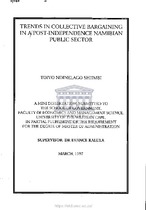Trends in collective bargaining In post-independence Namibian . Public sector
Abstract
The emergence of collective bargaining in the public sector is viewed as a product of economic,
political, technological and social dynamics regulating the economic relationship between the
government as employer and public sector employees. Although public sector employees have
been denied the right to organize themselves and to bargain collectively with their respective
governments, especially in many African countries, the profound changes during the recent years
has dramatically changed labour relations in the public sector. In many African countries,
particularly English speaking countries, the process of collective bargaining between the
government and public sector employees has gained prominence as the struggle to reconcile the
broad interest of the government and its employees has been waged in order to deal effectively with
public employment issues.
Namibia is one of the many English speaking African countries which is making tremendous efforts
to harmonize the employment relationship between the government and the public servants. But
these efforts are being hampered by the structural handicaps emanating from the historical legacy
of apartheid and its adjunt- authoritarianism (which has found firm roots in the country even after
five years of independence).

